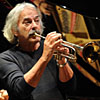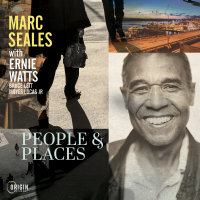Home » Jazz Articles » London Calling » Ornette Coleman's Meltdown is the Best Ever
Ornette Coleman's Meltdown is the Best Ever
London
June 12-21, 2009
Ever since it was announced in late March that Ornette Coleman was to curate the 2009 Meltdown festival at the South Bank, Coleman seemed to dominate the capital. The festival's trademark image of a young Coleman soulfully eyeballing the camera was everywhere, on larger-than-life posters in the London underground, in adverts in papers and magazines, on flyers and handbills, and online. It was mesmerising and inescapable. But no-one wanted to escape it.
Instead, music fans were abuzz with speculation about the acts that would feature at Ornette's Meltdown. As its first jazz curator, Coleman's stewardship of Meltdown raised expectations high. In recent years, the overwhelming emotion generated by Meltdown had become one of disappointment as a procession of high profile curators failed to deliver. Those with longer memories fondly recalled the festival's halcyon days when it was curated by

Elvis Costello
vocalsb.1954

Allen Toussaint
piano and vocals1938 - 2015

Bill Frisell
guitar, electricb.1951

Max Roach
drums1925 - 2007
And yes, we were right to have faith. Now that it is all over, it is clear and generally agreed: This was the best Meltdown ever. It even topped Costello's and Wyatt's. It was so good that it is worth cataloguing the ingredients that made it special, in the hope that future curators can learn from it and emulate its success.
Firstly, in his choice of performers and the way they were scheduled together, Coleman totally embraced the ethos of Meltdown, which is to cross barriers and to achieve unpredictable creative syntheses. Coleman himself led that process. Over the course of the festival's nine days, he played with a range of performers. On opening night he joined Philadelphia hip-hop band The Roots onstage, alongside fellow saxophonists

David Murray
saxophone, tenorb.1955

Bobby McFerrin
vocalsb.1950

Charlie Haden
bass, acoustic1937 - 2014
After Coleman, Bachir Attar & the Master Musicians of Jajouka were the festival's most regular performers and its best received. They played on all nine days of the festival, the majority of their appearances being in the open air. Every appearance drew a sizeable crowd and attendances increased day on day. As audiences warmed to their mesmeric blend of reeds and drums, so the musicians became increasingly outgoing and expansive, dancing and showing themselves to be real showmen. As well as their free appearances and those with the Coleman band, the musicians also joined Patti Smith onstage at her concert.
Predictably, for showmanship nobody outdid drummer

Han Bennink
drumsb.1942

Evan Parker
saxophone, sopranob.1944

Marc Ribot
guitarb.1954
Its free concerts and mass participation events contributed greatly to Meltdown's feel-good atmosphere, as did some fine sunny weather throughout. Two thirds of the events were free, including films about or by Ornette Coleman, Yoko Ono, the Master Musicians of Jajouka , and Patti Smith. In addition, there were free performances by such notable British bands as Acoustic Ladyland, Led Bib, Leafcutter John, Get the Blessing, and

Martin Speake
saxophone, altob.1958
Other participatory events centered on Voicelab, the South Bank's resident voice workshop; they held an open rehearsal with Ian Shaw leading, before their performance with Bobby McFerrin. Fittingly, they also led a mass participation event, People's Choir Sing Songs of Protest, prior to the concert by Liberation Music Orchestra, in which several hundred of us sang "We Shall Overcome," "The Internationale" and "Nkosi Sikelele Africa" with gusto and revolutionary fervour.
Ultimately, this Meltdown was such a success because it became a huge celebration of over fifty years of Ornette Coleman and his music. In concerts, on film and through guests, many facets of Colman's music were celebrated. The two concerts featuring Coleman and his band were billed as "Reflections of The Shape of Jazz to Come" and "Reflections of This is Our Music." Many audience members came expecting recreations of those two classic Colman albums. In true Coleman style, the reality belied such expectations. With his band of son Denardo on drums, Tony Falanga on double bass, Al MacDowell on bass guitar plus sundry guests, the original albums were used as inspiration for improvisation and exploration. Tellingly, much of the focus was on Coleman's own soloing. He was in flowing, fluid form on sax, and—in the absence of a trumpet player to duet with—he also contributed some incisive interjections on trumpet. The free-flowing nature of the two concerts was indicated by the fact that, at the end of the second concert, Charlie Haden joined Coleman for an encore of "Lonely Woman," a track originally on The Shape of Jazz to Come. In keeping with the spirit of the evening, no-one minded. At the end of it (and of Meltdown itself) there was a huge outpouring of affection and warmth towards Coleman. Cries of "We love you, Ornette" and "Thank you" filled the air alongside prolonged applause and cheering. Coleman patrolled the edge of the stage for a long time, greeting well-wishers, shaking hands and signing autographs. After he had finally gone, we were left feeling overwhelmed with one dominant thought: "Please come back to London soon."
Coming soon: As well as Meltdown, June in London also brought the Unnamed Music Festival, organised by the Another Timbre label. Among other highlights, the festival featured two sets from Keith Rowe. Before his first performance, Rowe gave a rare interview to London Calling. It will appear very soon.
The month closed with Bruce Springsteen playing a concert in Hyde Park to a crowd of 50, 000 delirious fans. What song did he open the concert with? "London Calling," of course. Smart move, Bruce.
Tags
Ornette Coleman
London Calling
John Eyles
Elvis Costello
Allen Toussaint
Bill Frisell
Max Roach
David Murray
Bobby McFerrin
Charlie Haden
Han Bennink
evan parker
Marc Ribot
Martin Speake
Comments
PREVIOUS / NEXT
Support All About Jazz
 All About Jazz has been a pillar of jazz since 1995, championing it as an art form and, more importantly, supporting the musicians who make it. Our enduring commitment has made "AAJ" one of the most culturally important websites of its kind, read by hundreds of thousands of fans, musicians and industry figures every month.
All About Jazz has been a pillar of jazz since 1995, championing it as an art form and, more importantly, supporting the musicians who make it. Our enduring commitment has made "AAJ" one of the most culturally important websites of its kind, read by hundreds of thousands of fans, musicians and industry figures every month.








 Buy Now
Buy Now

















